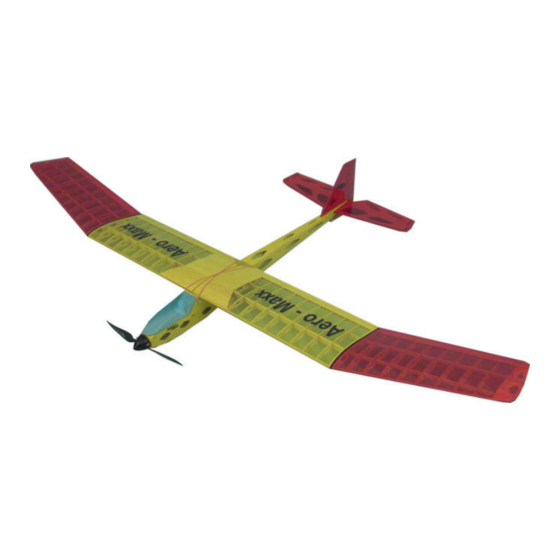aero-naut 1316/00 Instructions de construction - Page 4
Parcourez en ligne ou téléchargez le pdf Instructions de construction pour {nom_de_la_catégorie} aero-naut 1316/00. aero-naut 1316/00 4 pages. Electric-powered rc model aircraft

Aero-Maxx
• Connect the steel pushrods to the servo output discs using the swivel pushrod connectors supplied. Check
that the connectors rotate smoothly.
• Place the receiver in the forward area of the compartment under the wing, right at the bottom of the
fuselage. Connect the servos and the speed controller to the receiver, then pack foam round it to hold it in
place. Be sure to read the installation instructions supplied by your RC system manufacturer.
• Assemble the model completely. Use four rubber bands to attach the wing to the fuselage: two crossed
over diagonally, two parallel to the fuselage sides.
• Check the model's Centre of Gravity (balance point), and adjust the position of the flight battery if
necessary until it balances in the range 80 to 85 mm from the wing root leading edge. Fix the battery in
this position using Velcro tape.
The settings
• Switch the transmitter on first, and check that the throttle stick is at the "stop" position. Switch on the
receiver.
• Check the control functions: the rudder should move 30 mm to each side of centre when the stick is
moved. Set the elevator travel to 15 mm up and 10 mm down. Check, then check once more that the
controls work in the correct "sense", i.e. left-stick really does produce left-rudder.
• Check the motor run. Caution: the spinning propeller represents an injury hazard!
The first flight
• If everything is in order, there is now nothing to stop you flying the model for the first time. If you are a
beginner, we urge you to join a local club and ask an experienced pilot for help. You are sure to find
somebody who will test-fly the aeroplane for you, and teach you the art of model flying step by step.
• However, it is also possible to try your luck on your own: wait for a day with little or no breeze, and give the
model a gentle launch with the wings level and the nose angled slightly above horizontal. Limit yourself
initially to correcting the angle of climb; don't allow the model to slow down too much. If the model turns to
one side, apply opposite rudder to keep it flying straight.
• Once the model is at a safe height, switch the motor off and allow the machine to glide. Try operating the
controls, keeping all movements small and gradual initially. Don't become over-confident too soon, and
always keep at a safe height – model flying is a skill which takes time to learn, just like driving a car or a
motorbike.
• Always land directly into wind. Allow the model to glide down with the motor switched off, and keep it flying
in a straight line towards the landing point. Apply gentle up-elevator just before it touches the ground. Avoid
using the rudder if possible when the aeroplane is very close to the ground.
Safety and hazard notes
• Model flying is a fascinating hobby. We recommend that you keep to the following basic guidelines
whenever you go flying, so that you do not annoy or endanger your fellow-man:
• You bear the responsibility for your actions and their consequences whenever you are flying a model
aircraft. For this reason it is essential to take out special model flying insurance. The best method of
obtaining this is to contact and join your national body (BMFA in Great Britain).
• In many countries it is only permissible to fly model aircraft using 35 MHz radio control equipment, but it is
your responsibility to find out if this applies where you live. You may need to register your RC equipment
with the authorities.
• Fly only at a site where you will not annoy or endanger anyone; the ideal place is an approved model
flying site.
• Never fly towards or over spectators, and never use other people as the target of dangerous or silly flight
manoeuvres.
• If your radio control equipment requires repair, have the work carried out by an expert. Interfering with the
equipment yourself will invalidate the official approval for your system.
• Do not switch your transmitter on until you have ensured that you will not cause interference to other radio
control systems in the vicinity. Don't switch on if your system is on the same frequency as another set.
• Do join a model flying club, where you will find the answers to all your questions and solutions to your
modelling problems.
Please note: we will not consider any claim under guarantee for damage caused by ignoring these
instructions. We accept no liability for consequent damage which may result from any accident. It is
essential to observe the assembly instructions accurately when building and operating the model. The
building instructions include information relating to safe operation of the aeroplane. This model is by no
means a children's plaything.
All of us at the Aero-Naut Modellbau team hope you have many hours of pleasure building and
flying your "Aero-Maxx"!
4
Aero-Maxx building instructions
